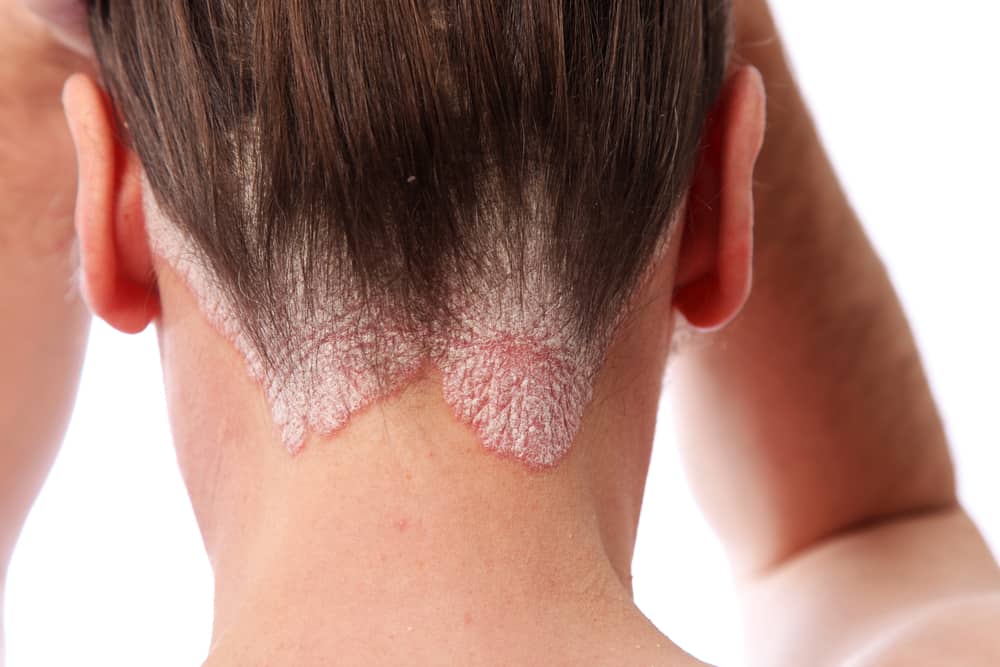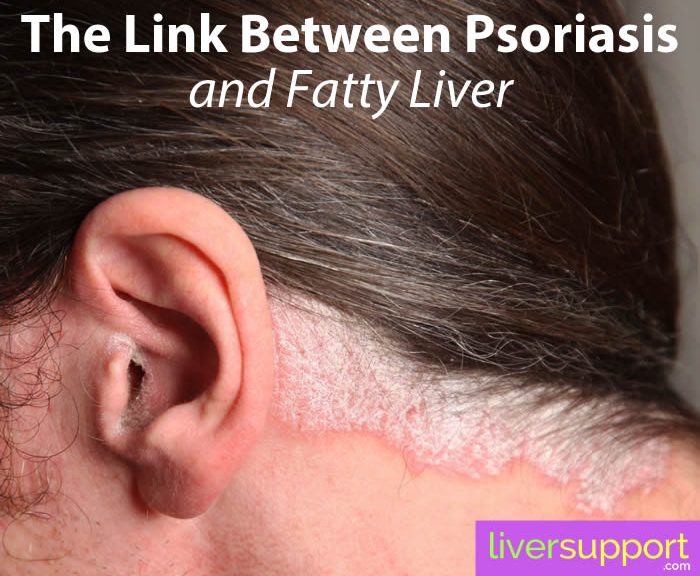
Previous
What Kind of Yogurt Can Help Reduce Your Fatty Liver?

Next
New Research Shows Cannabis Can Lower Risk of Fatty Liver
The Link Between Psoriasis and Fatty Liver
What is psoriasis, and how is this skin condition linked to fatty liver?
Psoriasis and fatty liver are two seemingly unrelated inflammatory disorders that often occur in the same individual.
- Psoriasis: A skin condition that is attributed to either genetics or the immune system, psoriasis is a common skin condition that speeds up the life cycle of skin cells.
- Fatty Liver: Affecting nearly one-third of American adults, fatty liver describes the accumulation of excessive fat in the liver cells.
Neither disorder is fully understood by the medical community.
Both psoriasis and fatty liver are devoid of a cure.
What Is Psoriasis?
According to the American Academy of Dermatology, approximately 7.5 million Americans have psoriasis, a condition that causes cells to build up rapidly on the surface of your skin. These extra skin cells form into scales and red patches that can be itchy and painful.
It is considered to be a chronic inflammatory disease of the immune system, and is often associated with other diseases and conditions, such as:
- diabetes
- cardiovascular disease
- metabolic disorder
- depression
How to Treat Psoriasis
Although there is no cure, treatment for psoriasis focuses on symptom management – and depends on its severity:
- Approximately 80% of psoriasis sufferers have mild to moderate disease.
- Approximately 20% of psoriasis sufferers have moderate to severe disease (affecting more than 5% of the body surface area).
There are several different types of psoriasis, the most common being plaque psoriasis. The plaques are dry, raised, red skin lesions covered with silvery scales that can occur anywhere on your body.

6 Other Types of Psoriasis
- nail psoriasis
- guttate psoriasis
- inverse psoriasis
- pustular psoriasis
- erythrodermic psoriasis
- psoriatic arthritis
What Is Fatty Liver?
Also known as hepatic steatosis, fatty liver is a buildup of fat in the liver that affects an estimated 30% of American adults. Some fat in the liver is normal, but too much (greater than 10%) can create inflammation and lead to liver injury.
Risk factors for fatty liver include:
- being overweight
- having diabetes
- insulin resistance
- high cholesterol
In addition, regular, excessive consumption of alcohol, toxins, and certain drugs can cause a fatty liver, too.
2 Types of Fatty Liver Disease
There are two primary types of fatty liver disease: non-alcoholic and alcoholic.

1) Non-alcoholic fatty liver disease (NAFLD) – Although experts do not yet fully understand NAFLD, this condition develops when your liver has difficulty breaking down fats.
Factors known to contribute to NAFLD include:
- obesity
- high blood fats
- diabetes
- metabolic syndrome
- genetics
When in the early stage of NAFLD, healthy lifestyle modifications that include good nutrition and regular exercise can reverse fatty liver.
If enough fat accumulates in your liver* that is not due to alcohol consumption, serious liver damage can result. Any type of serious, chronic damage to your liver can result in cirrhosis, which is the end stage of chronic liver disease.
To understand more about cirrhosis of the liver, check out the video below:
*Did you know that Clinical LiverSupport can help reduce fat accumulation in your liver?
2) Alcoholic fatty liver disease (ALD) – The earliest stage of alcohol-related liver disease, ALD occurs because heavy drinking damages your liver, impairing its ability to metabolize fats. Assuming the damage has not progressed to cirrhosis of the liver, abstaining from alcohol may allow your fatty liver to subside.
The Connection Between Psoriasis and NAFLD
The co-existence of psoriasis and NAFLD is staggering, with researchers claiming that up to 47% of psoriasis patients develop non-alcoholic fatty liver disease.
The connection between the two seems to be metabolic syndrome.

Metabolic syndrome is a combination of health issues, with at least 3 of these 5 markers occurring together:
- Blood Sugar: High fasting blood sugar levels – 100 milligrams per deciliter or higher.
- Triglycerides: High triglyceride levels – 150 milligrams per deciliter or higher.
- Abdominal Obesity: Waist measurement equal to or exceeding 40 inches in men and 35 inches in women.
- Hypertension: Blood pressure higher than 130/85 millimeters of mercury.
- High Density Lipoprotein: Levels of HDL (the good cholesterol) below 40 milligrams per deciliter in men and 50 milligrams per deciliter in women.
According to a study published in the February 2016 edition of the journal Gastroenterology Review, “psoriasis with NAFLD was positively associated with three components of metabolic syndrome: hyperglycemia, hypertriglyceridemia, and abdominal obesity.”
In addition, the researchers found that more obese people with psoriasis had NAFLD compared to those with psoriasis who were not obese. Their findings also indicated that people with psoriasis and NAFLD had higher blood pressure than those that did not have both conditions.
Why The Link Between Psoriasis and Fatty Liver Matters
Although both psoriasis and NAFLD are considered to be chronic conditions that do not have cures, recognizing the link between the two is valuable.
For those affected by psoriasis, taking steps to prevent metabolic syndrome carries greater urgency. The steps for preventing or reversing metabolic syndrome equate to healthy lifestyle choices such as:
- Eating wisely with a low sugar, complex carbohydrate, low saturated fat, high protein, high fiber, low chemical diet. A majority of Americans would feel better and live longer on the fatty liver diet.
- Exercising regularly by consistently engaging in moderate to vigorous physical activity 3 to 5 times per week.
Conclusion
Squelching liver inflammation from NAFLD is possible. Through diet and exercise, excessive weight can be shed, blood pressure can be lowered, fat ratios in your blood can improve and blood sugar can stabilize.
This means that every marker of metabolic syndrome can be cleared, reducing the threat of non-alcoholic fatty liver disease.
The journey towards metabolic health is worthwhile – because striving to manage psoriasis poses enough of a challenge, without adding the health hazard of excessive fat inflaming your liver and possibly leading to cirrhosis.
Editor’s Note: Take a look at these alternative options for treating metabolic syndrome.
https://psoriasisnewstoday.com/2017/01/12/psoriasis-may-be-linked-to-liver-disease/, Psoriasis May Be Associated with Liver Disease, Research Shows, Joana Fernandes, PhD, Retrieved September 17, 2017, Psoriasis News Today, January 2017.
https://www.aad.org/media/stats/conditions/psoriasis, Psoriasis, Retrieved September 17, 2017, American Academy of Dermatology, 2017.
https://www.everydayhealth.com/psoriasis/living-with/what-you-need-know-about-psoriasis-liver-disease/, What You Should Know About Psoriasis and Nonalcoholic Fatty Liver Disease, Sandy McDowell, Retrieved September 17, 2017, Everyday Health Media, LLC, 2017.
http://www.healthline.com/health/fatty-liver#overview1, Fatty Liver, Retrieved September 17, 2017, Healthline Media, 2017.
http://www.mayoclinic.org/diseases-conditions/psoriasis/home/ovc-20317577, Psoriasis Overview, Retrieved September 17, 2017, Mayo Foundation for Education and Research, 2017.
https://www.ncbi.nlm.nih.gov/pmc/articles/PMC4382145/, Nonalcoholic Fatty Liver Disease and Psoriasis, R. Prussick, MD, et al, Retrieved September 17, 2017, The Journal of Clinical and Aesthetic Dermatology, March 2015.
https://www.psoriasis.org/about-psoriasis, About Psoriasis, Retrieved September 17, 2017, National Psoriasis Foundation, 2017.






